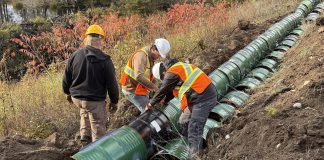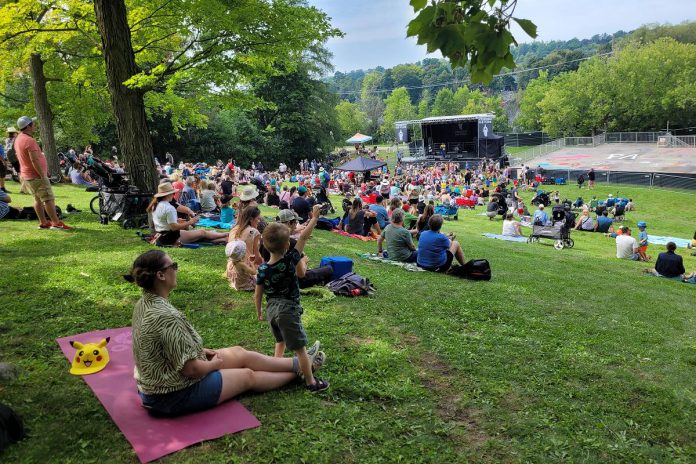
Thirty-six years after the Peterborough Folk Festival was first organized in 1989, it has grown into so much more than a music festival; it’s become a four-day community event that shows the best of the region’s music — and its generosity.
Despite its growth, the festival, which will run from August 14 to 17 this year, remains entirely admission-free — making it one of only two remaining admission-free folk festivals in Ontario. If that’s not impressive enough, the event is exclusively run by volunteers.
“Because we’re such a community-oriented event, we do have our values and we live by those, and I think that’s really part of why the festival has remained so strong in our 36 years,” says festival chair Rob Davis.
“We really do fall back on our strengths, and we work hard to put them in place — environmental sustainability, diversity and inclusion in the lineup and audiences, support for children and families, support for local artists, and connecting with First Nations nearby,” Davis adds. “All of that is important to us.”
Now headed into his third festival as chair, Davis spent many years enjoying the festival from the audience since he attended for the first time in 1999, shortly after unpacking his bags after moving to Peterborough.
“I remember thinking, what a cool town this is to be able to pull something like this off as a free-admission community event, with happy people everywhere, a really chill atmosphere, great music, and friends meeting up with friends,” he recalls.
“I’ve lived in lots of other places across the province and across the country, and stuff like this does not happen in other places — nothing like the scale of what we do as a free-admission festival with Peterborough Folk Festival.”
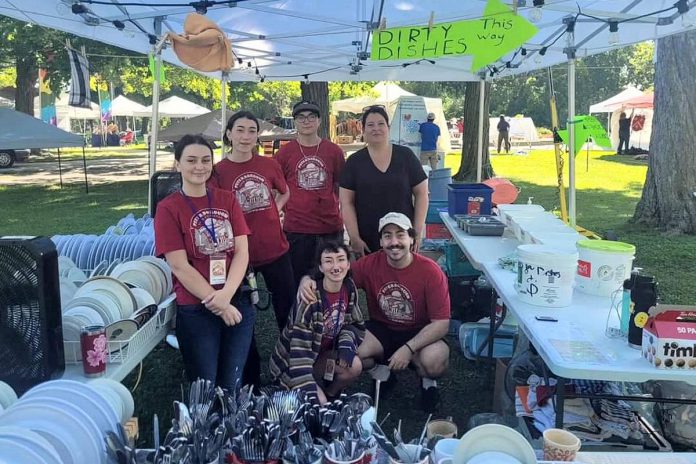
According to the festival’s artistic director Ryan Kemp, who attends conferences with other music festival organizers from across the country, the Peterborough Folk Festival is highly “respected by peers” in the industry. Perhaps that comes as no surprise, given that it brings in $1.3 million in economic impact for the city through its 15,000 attendees each year.
“From our surveys, there’s a lot of people from out of town so it’s great to bring them to Peterborough and say, ‘Have you been to the Peterborough Zoo, or have you been to the Lift Lock, or the Canoe Museum?'” says Kemp. “It’s really just about bringing people here and together, and it’s very unique.”
What began as a half-day festival has since grown into a four-day event, with ticketed concerts taking place on Thursday and Friday in downtown Peterborough, and the free-admission part of the festival happening on three stages in Nicholls Oval Park during the weekend.
With policies on inclusion and a gender parity commitment, the music each year is “multi-generational” says Kemp, who adds that this year there were over 700 submissions from artists who applied from as far away as the U.K. and Europe.
“It’s really exciting to see that, and see the recognition of the festival grow nationally,” says Kemp, noting it also provides more exposure for the local artists who perform.
“We want artists to come in and to build up their reputations and for people to get to see them at other venues like Jethro’s, the Pig’s Ear, and Market Hall, where they’ll eventually play. (Being) part of the ecosystem is how we see ourselves as a festival.”
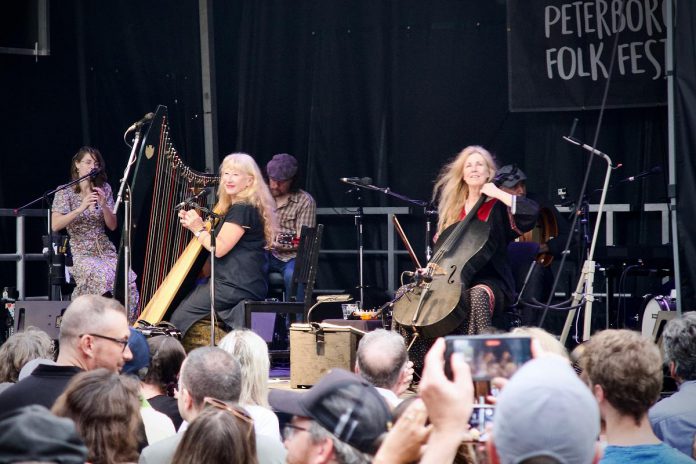
Another program that has the Peterborough Folk Festival punching above its weight is the Emerging Artist Award. Considering the first award in 2001 went to the now seven-time Juno award winner Serena Ryder, the recognition can be a step on the road to stardom for a local musician or band.
“We’re so blessed in Peterborough to have so many great artists,” says Kemp. “The biggest thing is to interweave them with these touring artists at the festival.”
With support from the Ontario Trillium Foundation, in recent years the festival has been able to fund the purchase of essential equipment for the event, like canopy tents, folding tables, and cords. Prior to the purchases, volunteers drove to Orillia before and after the festival to borrow cable ramps from other event organizers.
“All that helps with sustainability of the festival by making it more professional for artists and audiences — and it makes it more sustainable for all volunteers too,” says Davis. “Behind the scenes, we’re just trying to get more and more set up and established to make this festival as sustainable as we can, so that we’re well set up to continue in the future.”
That focus on sustainability connects to environmental initiatives as well, as organizers are always in search of ways to make the festival more environmentally friendly. That includes having volunteer crews washing the reusable dishes for food vendors, hosting shuttle transportation from downtown Peterborough, and sending as little waste to the landfill as possible. For example, with over 15,000 attendees over two days, the festival sends only around six bags of waste to the landfill.
With so much going into the festival weekend, planning begins a full year in advance — often at the previous year’s festival.
“We’re always thinking about what would work better and what the audiences are reacting to,” says Kemp. “We’re always thinking about how we can improve it and always asking people too. It’s the Peterborough Folk Festival, so we want to ask and hear suggestions because it’s everyone’s festival.”
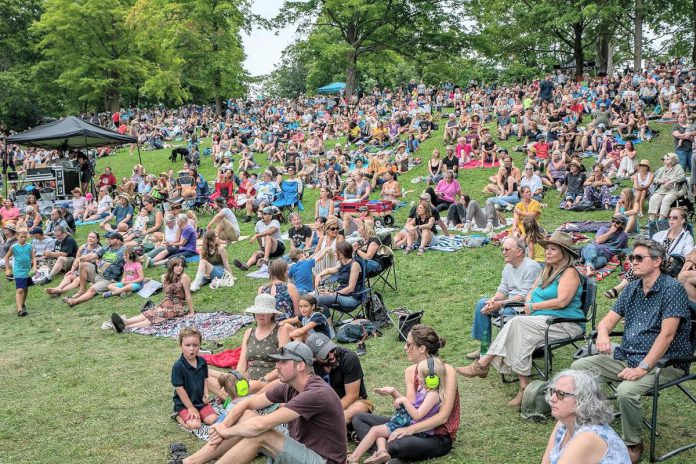
Alongside Davis and Kemp, there are 10 board directors who lead various committees of community members from eco-committees to production committees, and everything in between. The year-round volunteers team up with the 200 volunteers who show up for event weekend, lending their hands at the children’s village, washing dishes, parking bikes, and much more.
“It’s incredible, the team that comes together,” says Kemp. “It’s nice to see so many people want to get involved and see the festival grow. It’s just been really amazing to see that support.”
While Davis notes they’ve had a “successful recruitment” of volunteers, and the festival’s revenue from sponsors and funding remains strong, the dollars do not go as far as they once did.
“Some of these other costs that we have no choice but to pay if we’re going to have this festival — renting the stage, food, electrical permits — go up and are eating a greater and greater share of the overall revenue, which is leaving us squeezed in terms of the performer budget,” says Davis.
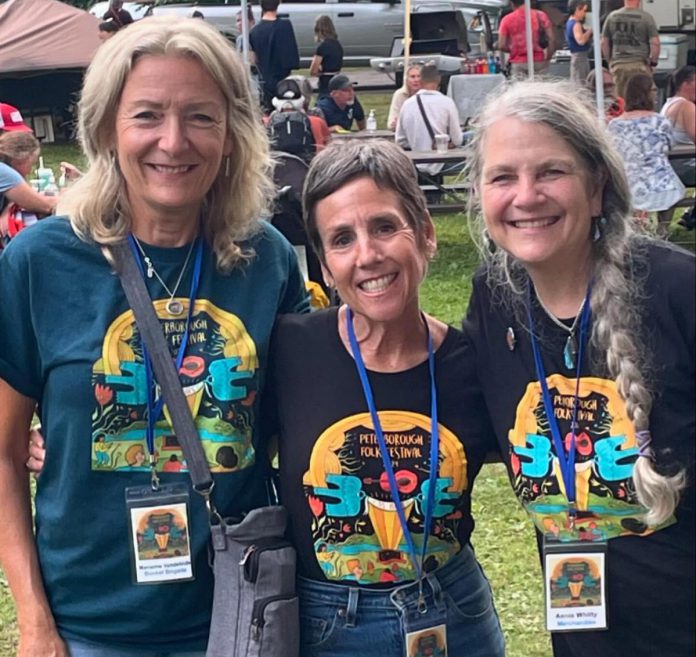
For his part, Kemp adds that headlining artist fees have “doubled or tripled” in the past few years — something that’s not obvious to audiences as they never have to pay anything to see the performers, but is important to the festival for attracting big-name headliners.
“It’s amazing what you can see at the festival and the artists that will perform, and it’s all free,” he says. “Our goal has always been to get the artist fee as high as possible and that’s something we’ve built through revenue.”
A larger artist budget would allow the festival to pay for the more in-demand headliners, drawing a larger crowd, and bringing in more listeners for the emerging local talent which, according to Kemp, is one of the most important aspects of Peterborough Folk Festival.
“It’s to support the (headliner) artist and give our local artists a chance to play in front of a big crowd,” adds Kemp. “We want them to get that awareness. We’ve heard many times where a local artist will perform at the festival and they’ll get other gigs from it, whether it’s private shows or other places they get to play. That’s our main goal — to support the artists.”
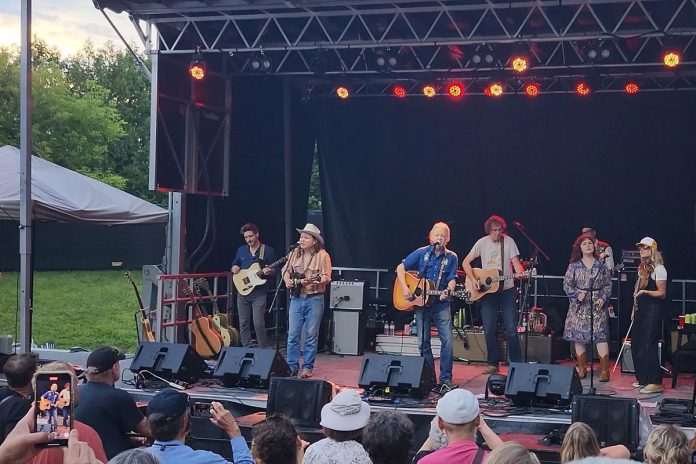
While other festivals might charge hundreds of dollars per ticket to make up 85 per cent of their operational fees, keeping admission free at the Peterborough Folk Festival is something Davis says continues to be a priority.
“We talk about it every couple of years, and have a big heart to heart, asking ourselves ‘Can we continue like this?’ And we still have, but it’s not easy,” Davis says.
He adds that keeping the festival admission-free keeps it accessible to everyone, including families with children and older adults.
“We really do see ourselves as a community event and a community service too,” Davis says. “We like to be that gathering place for people, and putting up fences and selling tickets and having bracelets would shut a lot of people out that we want to be able to experience the festival.”
“We’ve had lots of people saying this is one of the reasons they live in Peterborough, and this is one of the things that make this town a community — and we would lose that if we had to sell $200 tickets for the weekend.”
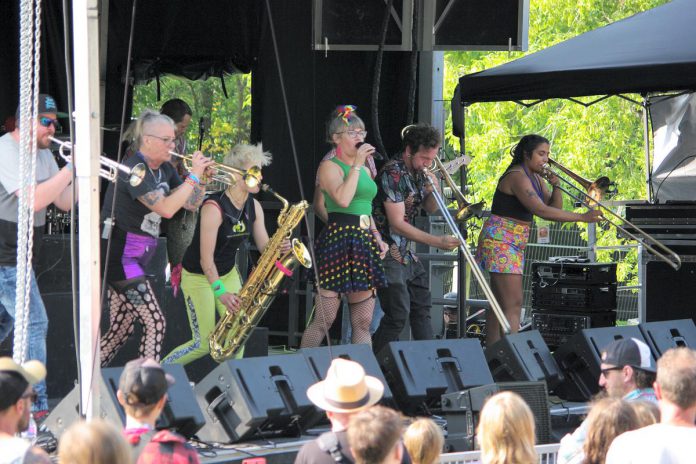
Davis credits a large part of that to the festival volunteers who donate their time to keep it accessible.
“I think it’s a real testament to how much the festival connects with people in the community, the fact that people will want to come out to volunteer,” he says. “It comes from the commitment and belief in what we do, and we see how much it means to the community.”
In addition to the support of volunteers and government grants it receives, the Peterborough Folk Festival relies on sponsors and community donations to keep the festival free and inclusive for everyone.
For more information on sponsoring the 2025 festival, visit www.peterboroughfolkfest.com/sponsor. To donate to the festival, visit www.peterboroughfolkfest.com/donate.


























